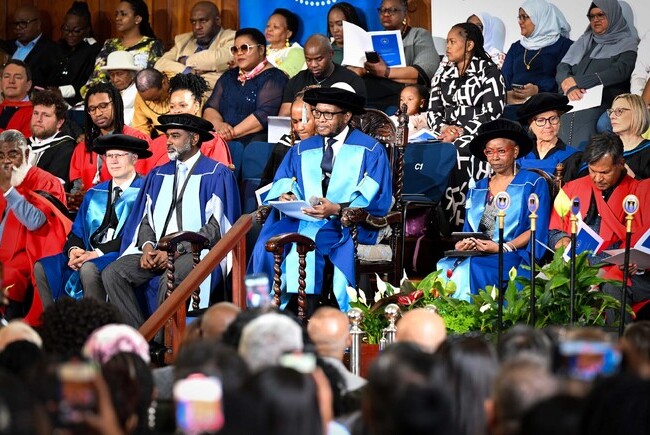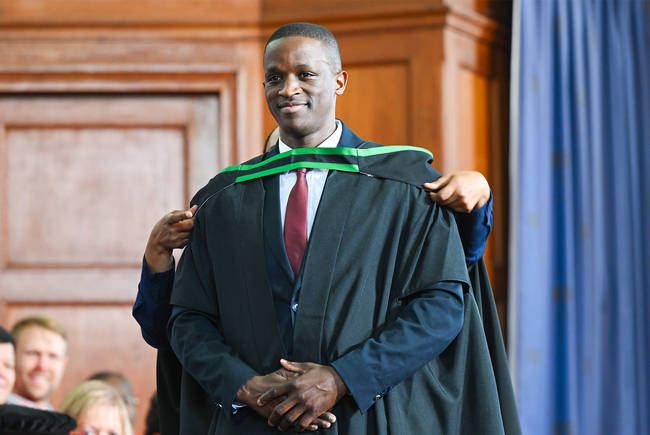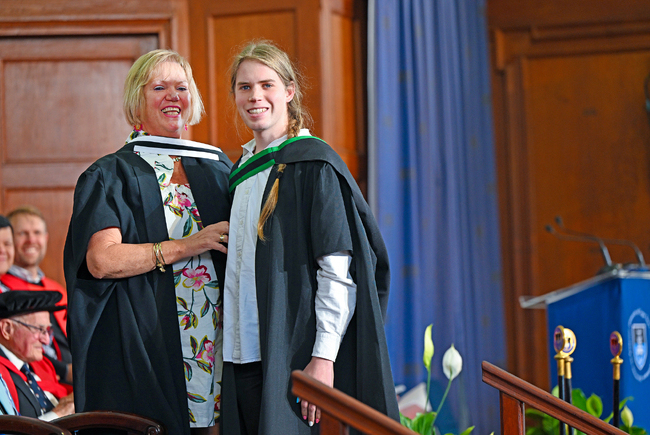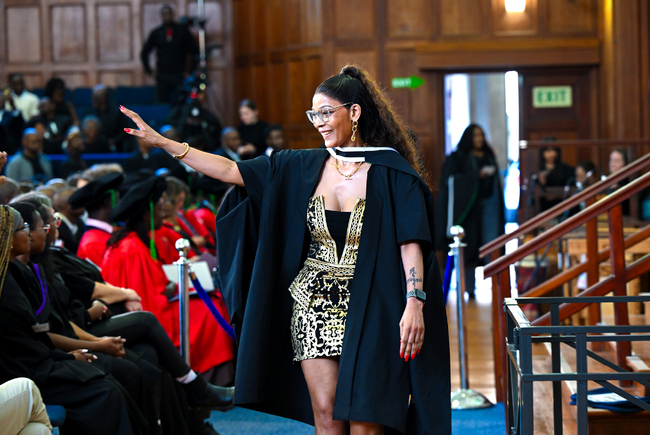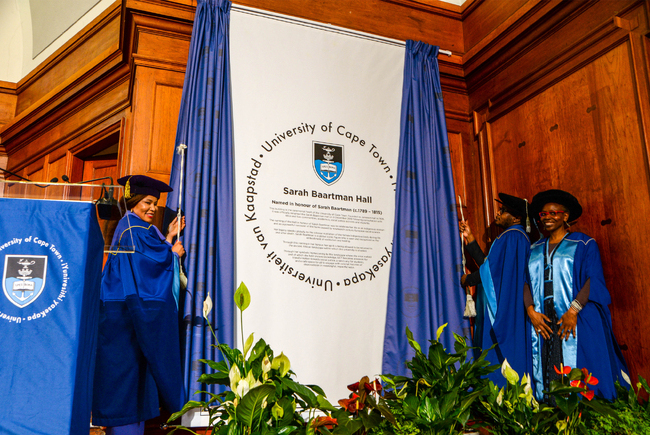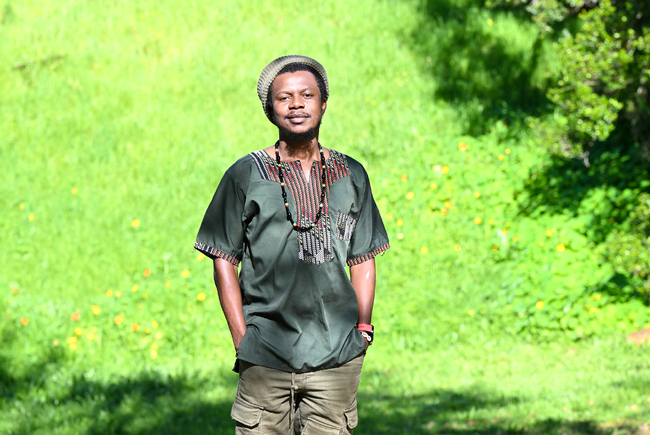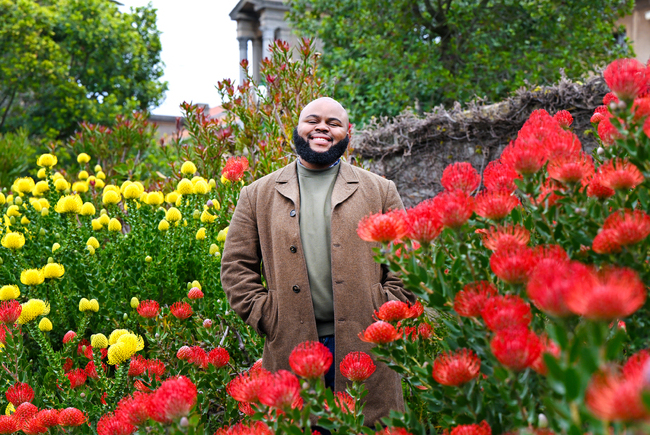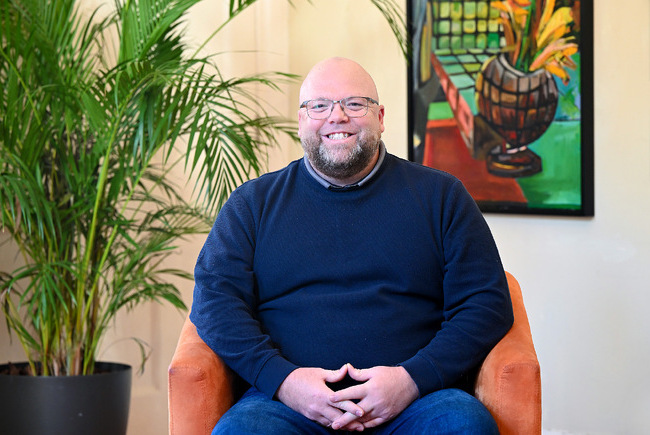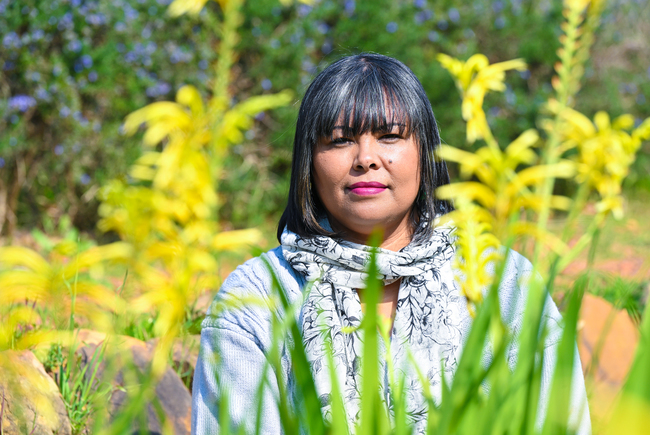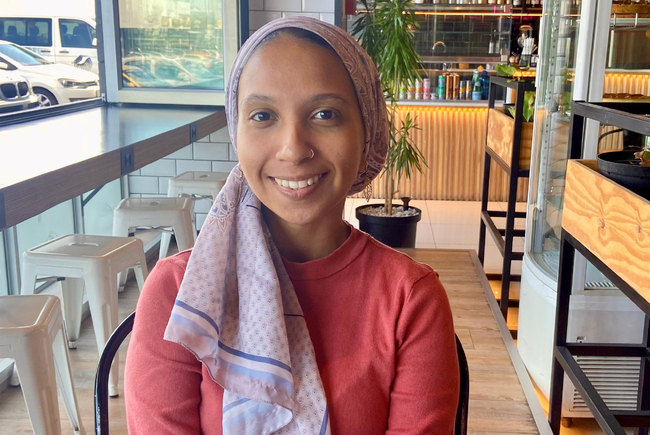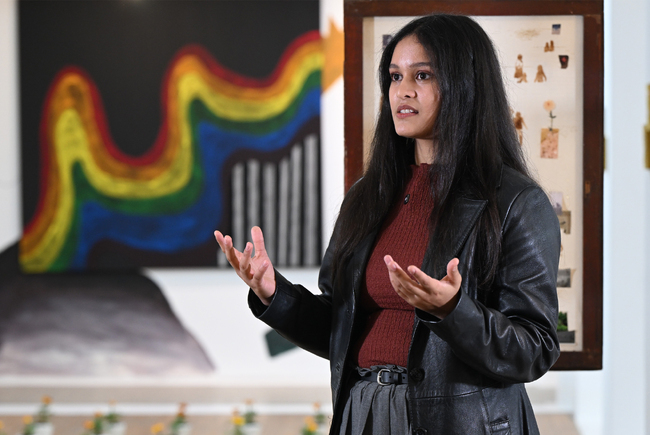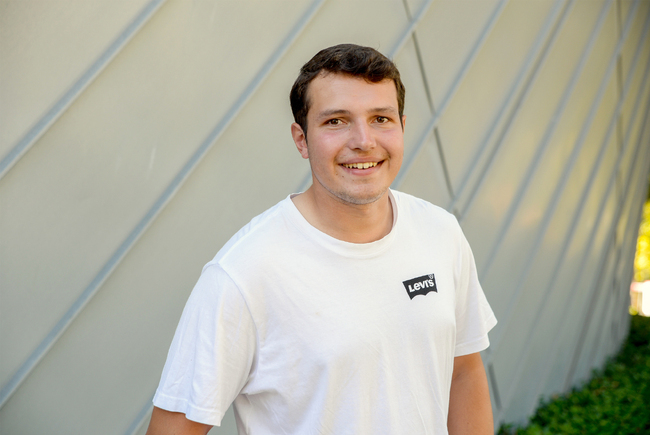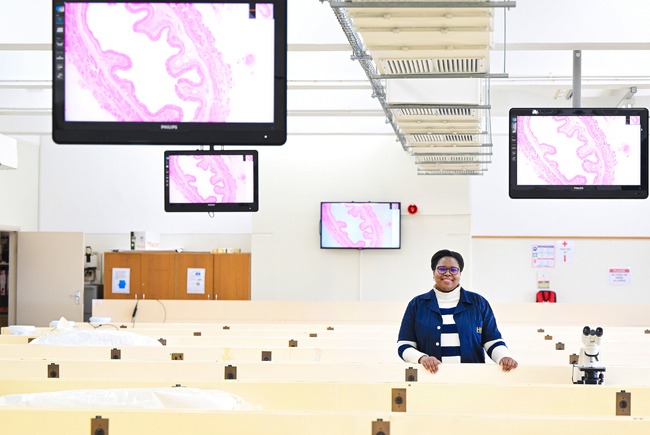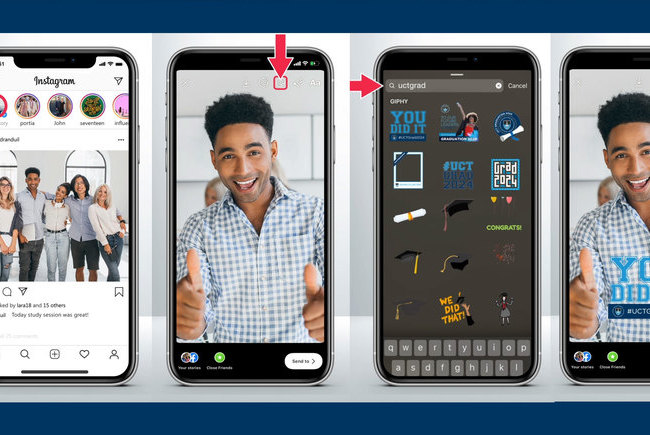Music, queerness, and selfhood
10 September 2025 | Story Myolisi Gophe. Photos Lerato Maduna. Read time 7 min.
For Fumani Jwara, the journey through music, identity, and academic research has been anything but linear. His master’s project at the University of Cape Town (UCT), a combination of an extended play (EP) titled Patches and an autoethnographic dissertation, explores the intersections of queerness, marginalisation, and creativity in contemporary South Africa.
“It’s like, let me acknowledge the music side and challenge myself to create something that could speak to my experiences, my interactions with people, especially where identity and marginalisation are critical, particularly in South Africa,” Fumani explained. “I focus on queer identities. I use an autoethnographic approach, where I subject myself as the data, reflecting on select, yet very important experiences navigating what queerness and being a black queer South African look like. We’re a constitutional democracy, yet parts of society, where attitudes surrounding queerness are concerned, remain largely conservative, despite the hard-fought-for progress that has been made by activists, scholars and creatives in advocating for queer rights and visibility. We’re still struggling to find a middle ground.”
Supervised by Professor Adam Haupt, the director of the Centre for Film and Media Studies, his work towards his master’s degree in global media and communications is a joint venture between UCT and the London School of Economics (LSE) in the United Kingdom (UK) and is believed to be the first music project for a master’s in this programme.
Finding a voice through music and identity
Describing himself as “an all-rounder, inter-disciplinary creative”, Fumani’s fascination with music began during his childhood in Johannesburg, where he was born and bred. “I was never the typical male child. If I had to choose between playing sports and engaging in cultural activities like school concerts or public speaking, I’d always choose the cultural. Even when presented with music or athletics, I would gravitate toward music. That already pushed me into spaces where I was marginalised and stereotyped because it was expected of me to be and act like other boys. I was teased, bullied, and forced to find ways to assert my identity. It became even worse once I introspected away from the noise and was proud of who I was and comfortable in my skin. I was a constant target because I was not shying away from being myself.”
“Owning our truths – the good, the bad, the messy – allows us to present an authentic self, particularly in a society that often demands conformity.”
Yet, Fumani turned these experiences into a lens for reflection. “Navigating the label of queer, I had to find my voice and figure out how to position myself in a world where I wasn’t the boys-boy type. South Africa, like much of Africa, often considers queerness as ‘Western’, despite historical evidence of pre-colonial queer identities. I had to navigate personal identity within this societal framework – in friendships, romantic encounters, and familial interactions – while remaining true to myself.”
And, as he had noted from an early age, music became a connective tool. “Music connects us to memory and experience. I often say that music is akin to visual culture and communication because it, too, tells a story, but through sound. When creating the EP, I thought this was how we could address some of the issues or memories we have as individuals. Each song in Patches represents a fragment; a memory at a specific time. Life is not linear; each experience, whether rough or smooth, is a patch that contributes to who we ultimately become. Owning our truths – the good, the bad, the messy – allows us to present an authentic self, particularly in a society that often demands conformity.”

The creative process, however, came with its own challenges. There were three major difficulties, he said. Firstly, selecting which story to tell. “Autoethnography requires vulnerability, and I knew some people might identify with parts of my story. Secondly, music production was far more complex than he anticipated. “Translating the sound in my head into a tangible product was a technical and creative challenge.” And lastly, he had to manage perfectionism – wanting to put his absolute best foot forward. “Even after the thesis and EP were awarded a distinction, I still felt the urge to refine it further.”
These challenges were compounded by the pandemic. “I started the UCT phase of this programme during COVID-19, after completing the LSE phase in the UK, so much of my work was digital. I wasn’t on campus until a year later, by which time I had shifted focus to balancing work and the creative process. My supervisor was incredibly supportive, introducing me to autoethnography and encouraging the music component — the first music project for an MA in this programme. That support was crucial in allowing me to produce five of the six tracks myself and learn music production at high intensity.”
Challenges, breakthroughs, and new directions
The project also raised questions about the role of higher education. “I hope this serves as an example of interdisciplinary and creative research. There’s a high focus on STEM [science, technology, engineering and maths] degrees, and for a country such as ours that has vast social realities that are equally critical, creative research equally matters. When universities embrace interdisciplinary and practical approaches, graduates leave with skills that can be applied meaningfully, beyond theory and applicable across disciplines.”
For Fumani, Patches is more than an EP or thesis. “This project is proof that even fragmented experiences – rough patches and smooth patches alike – can come together to form something authentic and powerful. If this work inspires even one person, it has served its purpose.”
Looking ahead, Fumani sees multiple possibilities. “I’m excited about the next chapter, whether it is returning fully to the creative space, recording a full album, performing live, or engaging in further interdisciplinary work. This project reminded me of what I love doing. It may take me in directions I haven’t yet imagined, but the most important thing for me is that I want it to inspire others. I want people to see the impact and potential of creative practice in academia and society.”
Opportunities are already arising. Fumani has been invited to present Patches at the International Research Networks (IRN) South-Stream, which is supported by the French National Centre for Scientific Research (CNRS) in Johannesburg. This network brings together select creatives and digital & cultural studies researchers to share innovative work.
 This work is licensed under a Creative Commons Attribution-NoDerivatives 4.0 International License.
This work is licensed under a Creative Commons Attribution-NoDerivatives 4.0 International License.
Please view the republishing articles page for more information.
Spring 2025 Graduation

The University of Cape Town (UCT) hosted graduation ceremonies from Monday, 8 September until Wednesday, 10 September 2025. The ceremonies were livestreamed on the website and UCT’s Facebook page (recommended for mobile devices like cell phones and tablets), and the video recordings will be available on this feature page and UCT’s YouTube channel as soon as possible after the event.
Graduation news
Graduation news
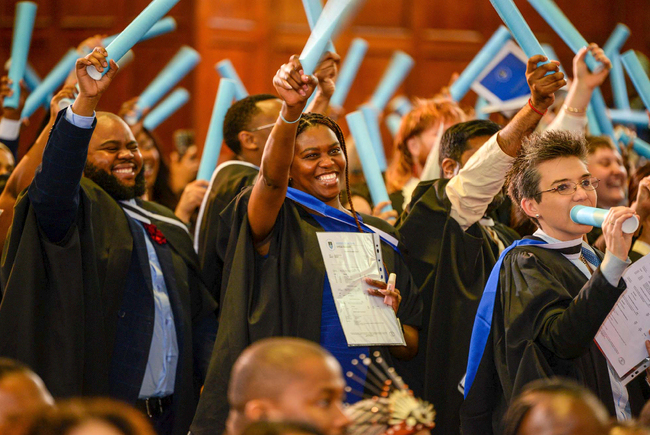
The University of Cape Town’s (UCT) Chancellor Dr Precious Moloi-Motsepe and Vice-Chancellor Professor Mosa Moshabela urged graduates at the spring graduation to use their education to enrich not only their own lives but also their communities, stressing the importance of values such as compassion, respect, and integrity in a volatile world.
25 Sep 2025
The University of Cape Town’s (UCT) spring graduation was marked by historic milestones, including the awarding of honorary doctorates to four distinguished individuals and the official renaming of Jameson Hall to Sarah Baartman Hall, among other notable highlights.
25 Sep 2025Inspirational graduates
Our stories: inspirational graduates
The UCT News team has profiled a cross-section of inspirational graduands whose stories have inspired us. To all those we haven’t been able to feature, we’d like to say: each one of you is an inspiration – to your university, your families and your communities. We wish you every success in the future.
Ceremony recordings
Ceremony recordings
Graduation programmes
The names of all of the spring 2025 qualifiers are listed in the graduation ceremony programmes. Congratulations to everyone who has graduated.
We are excited to see our UCT graduates unleash their potential for a fair and just society. Thank you for joining the celebrations on social media by using the #UCTGrad2025 hashtag.
Social media elements#UCTGrad2025 – social media elements
Customised Facebook and Instagram stickers are available on our social media platforms. Watch the tutorial videos here to see how easily you can get your online presence ready.








